Health Sciences Case Study: Applying Four Principles in Healthcare
VerifiedAdded on 2022/11/19
|7
|1346
|468
Case Study
AI Summary
This assignment presents a case study in health sciences, focusing on the application of the four principles of bioethics: autonomy, beneficence, nonmaleficence, and justice. The case involves a patient, James, suffering from kidney failure, and his family's differing views on treatment options, considering their Christian faith. Part 1 of the assignment requires filling out a chart analyzing the principles in the context of the case, gathering data on medical indications, patient preferences, quality of life, and contextual features. Part 2 involves answering two questions from a Christian worldview perspective. The first question explores which of the four principles is most pressing, while the second asks how a Christian might rank the priority of these principles. The analysis highlights the ethical dilemmas faced by healthcare providers and families when balancing medical interventions with patient beliefs and values.
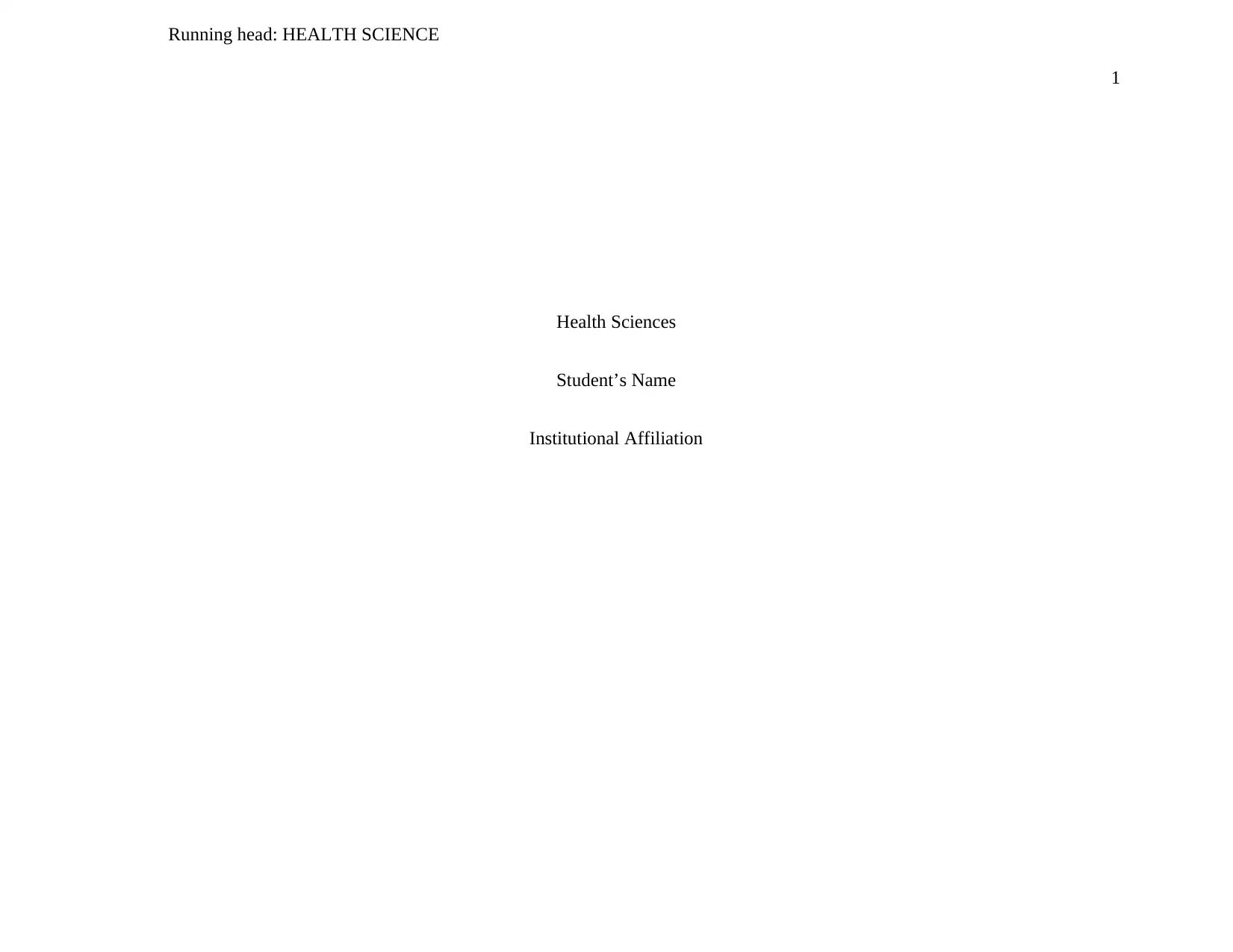
Running head: HEALTH SCIENCE
1
Health Sciences
Student’s Name
Institutional Affiliation
1
Health Sciences
Student’s Name
Institutional Affiliation
Paraphrase This Document
Need a fresh take? Get an instant paraphrase of this document with our AI Paraphraser
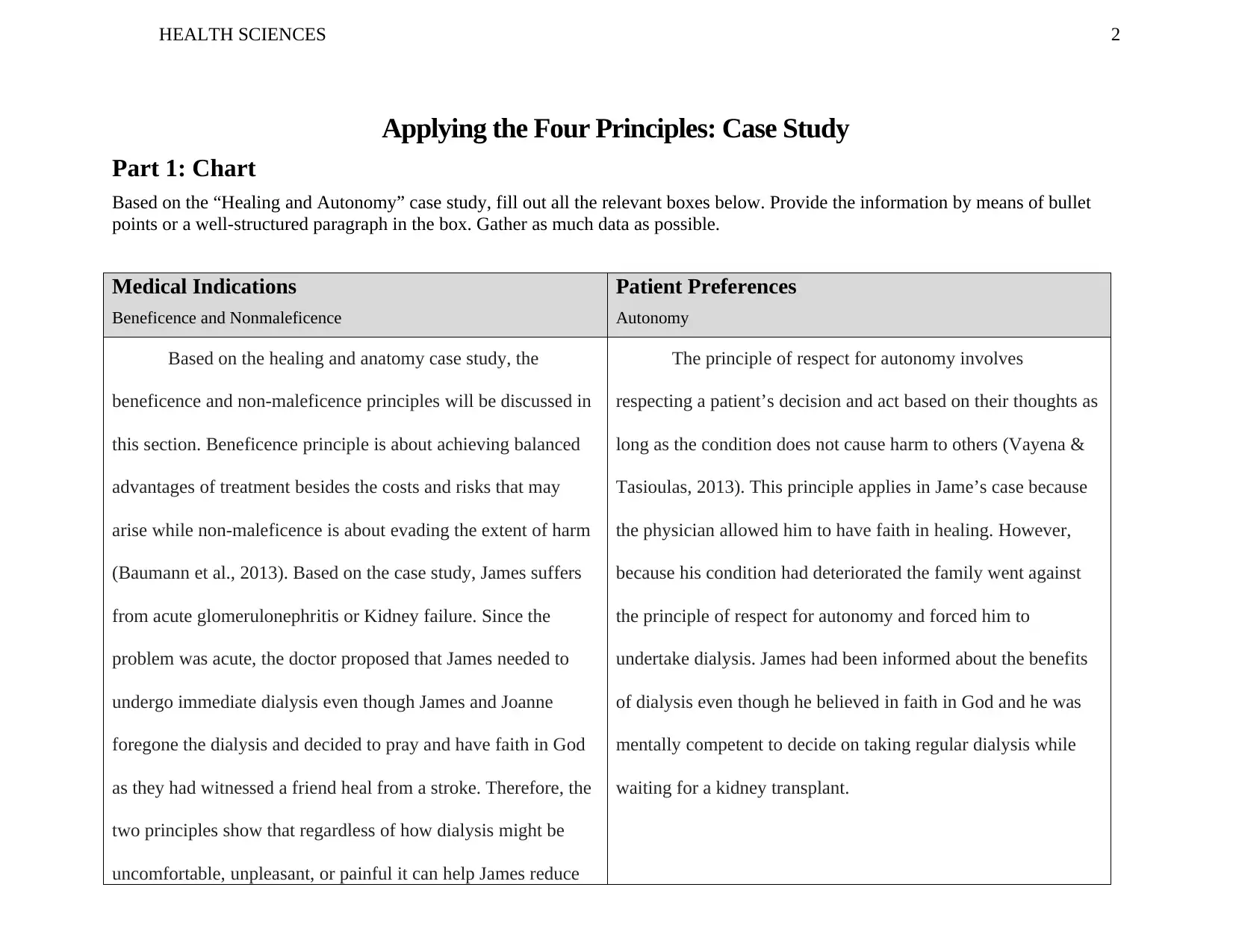
HEALTH SCIENCES 2
Applying the Four Principles: Case Study
Part 1: Chart
Based on the “Healing and Autonomy” case study, fill out all the relevant boxes below. Provide the information by means of bullet
points or a well-structured paragraph in the box. Gather as much data as possible.
Medical Indications
Beneficence and Nonmaleficence
Patient Preferences
Autonomy
Based on the healing and anatomy case study, the
beneficence and non-maleficence principles will be discussed in
this section. Beneficence principle is about achieving balanced
advantages of treatment besides the costs and risks that may
arise while non-maleficence is about evading the extent of harm
(Baumann et al., 2013). Based on the case study, James suffers
from acute glomerulonephritis or Kidney failure. Since the
problem was acute, the doctor proposed that James needed to
undergo immediate dialysis even though James and Joanne
foregone the dialysis and decided to pray and have faith in God
as they had witnessed a friend heal from a stroke. Therefore, the
two principles show that regardless of how dialysis might be
uncomfortable, unpleasant, or painful it can help James reduce
The principle of respect for autonomy involves
respecting a patient’s decision and act based on their thoughts as
long as the condition does not cause harm to others (Vayena &
Tasioulas, 2013). This principle applies in Jame’s case because
the physician allowed him to have faith in healing. However,
because his condition had deteriorated the family went against
the principle of respect for autonomy and forced him to
undertake dialysis. James had been informed about the benefits
of dialysis even though he believed in faith in God and he was
mentally competent to decide on taking regular dialysis while
waiting for a kidney transplant.
Applying the Four Principles: Case Study
Part 1: Chart
Based on the “Healing and Autonomy” case study, fill out all the relevant boxes below. Provide the information by means of bullet
points or a well-structured paragraph in the box. Gather as much data as possible.
Medical Indications
Beneficence and Nonmaleficence
Patient Preferences
Autonomy
Based on the healing and anatomy case study, the
beneficence and non-maleficence principles will be discussed in
this section. Beneficence principle is about achieving balanced
advantages of treatment besides the costs and risks that may
arise while non-maleficence is about evading the extent of harm
(Baumann et al., 2013). Based on the case study, James suffers
from acute glomerulonephritis or Kidney failure. Since the
problem was acute, the doctor proposed that James needed to
undergo immediate dialysis even though James and Joanne
foregone the dialysis and decided to pray and have faith in God
as they had witnessed a friend heal from a stroke. Therefore, the
two principles show that regardless of how dialysis might be
uncomfortable, unpleasant, or painful it can help James reduce
The principle of respect for autonomy involves
respecting a patient’s decision and act based on their thoughts as
long as the condition does not cause harm to others (Vayena &
Tasioulas, 2013). This principle applies in Jame’s case because
the physician allowed him to have faith in healing. However,
because his condition had deteriorated the family went against
the principle of respect for autonomy and forced him to
undertake dialysis. James had been informed about the benefits
of dialysis even though he believed in faith in God and he was
mentally competent to decide on taking regular dialysis while
waiting for a kidney transplant.
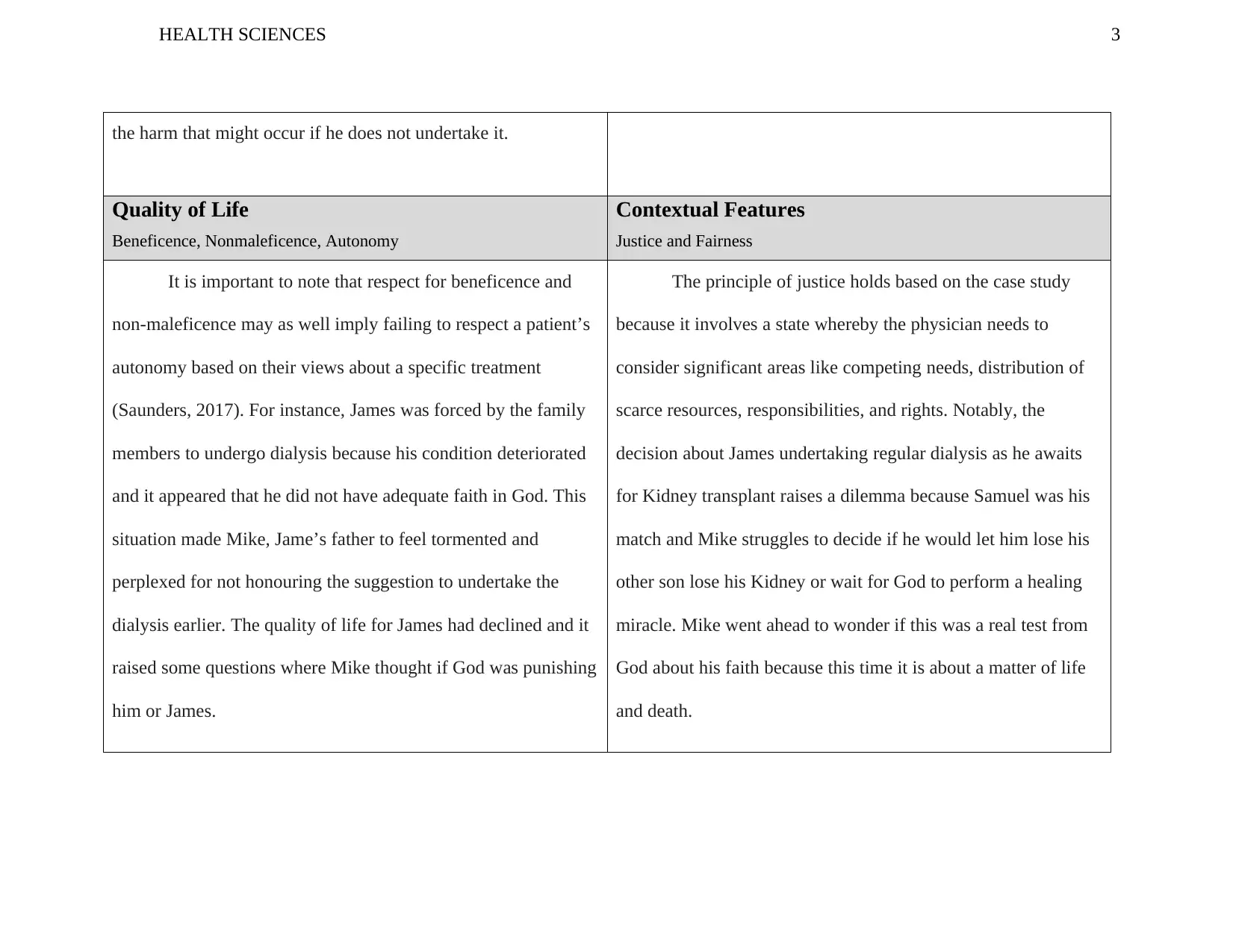
HEALTH SCIENCES 3
the harm that might occur if he does not undertake it.
Quality of Life
Beneficence, Nonmaleficence, Autonomy
Contextual Features
Justice and Fairness
It is important to note that respect for beneficence and
non-maleficence may as well imply failing to respect a patient’s
autonomy based on their views about a specific treatment
(Saunders, 2017). For instance, James was forced by the family
members to undergo dialysis because his condition deteriorated
and it appeared that he did not have adequate faith in God. This
situation made Mike, Jame’s father to feel tormented and
perplexed for not honouring the suggestion to undertake the
dialysis earlier. The quality of life for James had declined and it
raised some questions where Mike thought if God was punishing
him or James.
The principle of justice holds based on the case study
because it involves a state whereby the physician needs to
consider significant areas like competing needs, distribution of
scarce resources, responsibilities, and rights. Notably, the
decision about James undertaking regular dialysis as he awaits
for Kidney transplant raises a dilemma because Samuel was his
match and Mike struggles to decide if he would let him lose his
other son lose his Kidney or wait for God to perform a healing
miracle. Mike went ahead to wonder if this was a real test from
God about his faith because this time it is about a matter of life
and death.
the harm that might occur if he does not undertake it.
Quality of Life
Beneficence, Nonmaleficence, Autonomy
Contextual Features
Justice and Fairness
It is important to note that respect for beneficence and
non-maleficence may as well imply failing to respect a patient’s
autonomy based on their views about a specific treatment
(Saunders, 2017). For instance, James was forced by the family
members to undergo dialysis because his condition deteriorated
and it appeared that he did not have adequate faith in God. This
situation made Mike, Jame’s father to feel tormented and
perplexed for not honouring the suggestion to undertake the
dialysis earlier. The quality of life for James had declined and it
raised some questions where Mike thought if God was punishing
him or James.
The principle of justice holds based on the case study
because it involves a state whereby the physician needs to
consider significant areas like competing needs, distribution of
scarce resources, responsibilities, and rights. Notably, the
decision about James undertaking regular dialysis as he awaits
for Kidney transplant raises a dilemma because Samuel was his
match and Mike struggles to decide if he would let him lose his
other son lose his Kidney or wait for God to perform a healing
miracle. Mike went ahead to wonder if this was a real test from
God about his faith because this time it is about a matter of life
and death.
⊘ This is a preview!⊘
Do you want full access?
Subscribe today to unlock all pages.

Trusted by 1+ million students worldwide
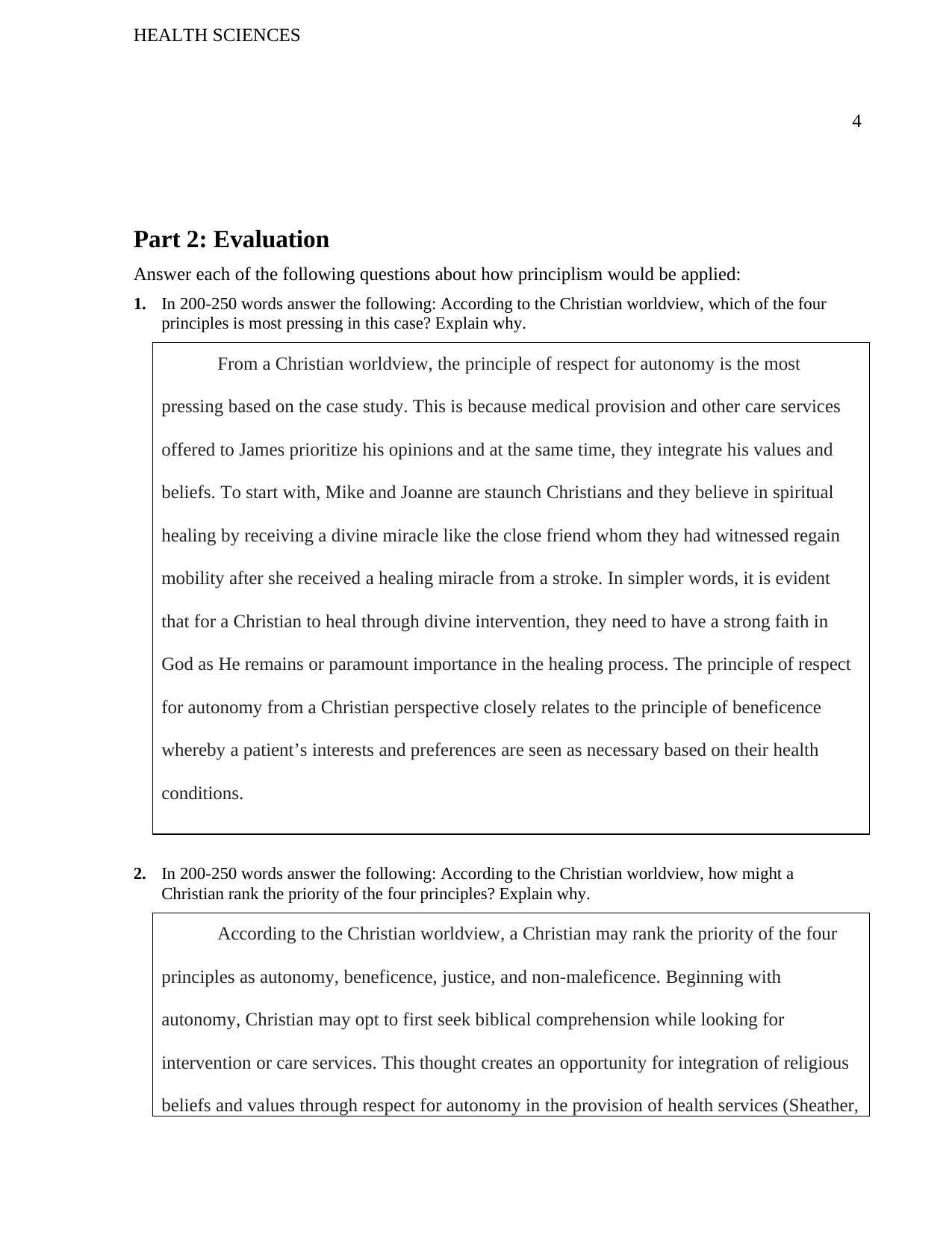
HEALTH SCIENCES
4
Part 2: Evaluation
Answer each of the following questions about how principlism would be applied:
1. In 200-250 words answer the following: According to the Christian worldview, which of the four
principles is most pressing in this case? Explain why.
From a Christian worldview, the principle of respect for autonomy is the most
pressing based on the case study. This is because medical provision and other care services
offered to James prioritize his opinions and at the same time, they integrate his values and
beliefs. To start with, Mike and Joanne are staunch Christians and they believe in spiritual
healing by receiving a divine miracle like the close friend whom they had witnessed regain
mobility after she received a healing miracle from a stroke. In simpler words, it is evident
that for a Christian to heal through divine intervention, they need to have a strong faith in
God as He remains or paramount importance in the healing process. The principle of respect
for autonomy from a Christian perspective closely relates to the principle of beneficence
whereby a patient’s interests and preferences are seen as necessary based on their health
conditions.
2. In 200-250 words answer the following: According to the Christian worldview, how might a
Christian rank the priority of the four principles? Explain why.
According to the Christian worldview, a Christian may rank the priority of the four
principles as autonomy, beneficence, justice, and non-maleficence. Beginning with
autonomy, Christian may opt to first seek biblical comprehension while looking for
intervention or care services. This thought creates an opportunity for integration of religious
beliefs and values through respect for autonomy in the provision of health services (Sheather,
4
Part 2: Evaluation
Answer each of the following questions about how principlism would be applied:
1. In 200-250 words answer the following: According to the Christian worldview, which of the four
principles is most pressing in this case? Explain why.
From a Christian worldview, the principle of respect for autonomy is the most
pressing based on the case study. This is because medical provision and other care services
offered to James prioritize his opinions and at the same time, they integrate his values and
beliefs. To start with, Mike and Joanne are staunch Christians and they believe in spiritual
healing by receiving a divine miracle like the close friend whom they had witnessed regain
mobility after she received a healing miracle from a stroke. In simpler words, it is evident
that for a Christian to heal through divine intervention, they need to have a strong faith in
God as He remains or paramount importance in the healing process. The principle of respect
for autonomy from a Christian perspective closely relates to the principle of beneficence
whereby a patient’s interests and preferences are seen as necessary based on their health
conditions.
2. In 200-250 words answer the following: According to the Christian worldview, how might a
Christian rank the priority of the four principles? Explain why.
According to the Christian worldview, a Christian may rank the priority of the four
principles as autonomy, beneficence, justice, and non-maleficence. Beginning with
autonomy, Christian may opt to first seek biblical comprehension while looking for
intervention or care services. This thought creates an opportunity for integration of religious
beliefs and values through respect for autonomy in the provision of health services (Sheather,
Paraphrase This Document
Need a fresh take? Get an instant paraphrase of this document with our AI Paraphraser
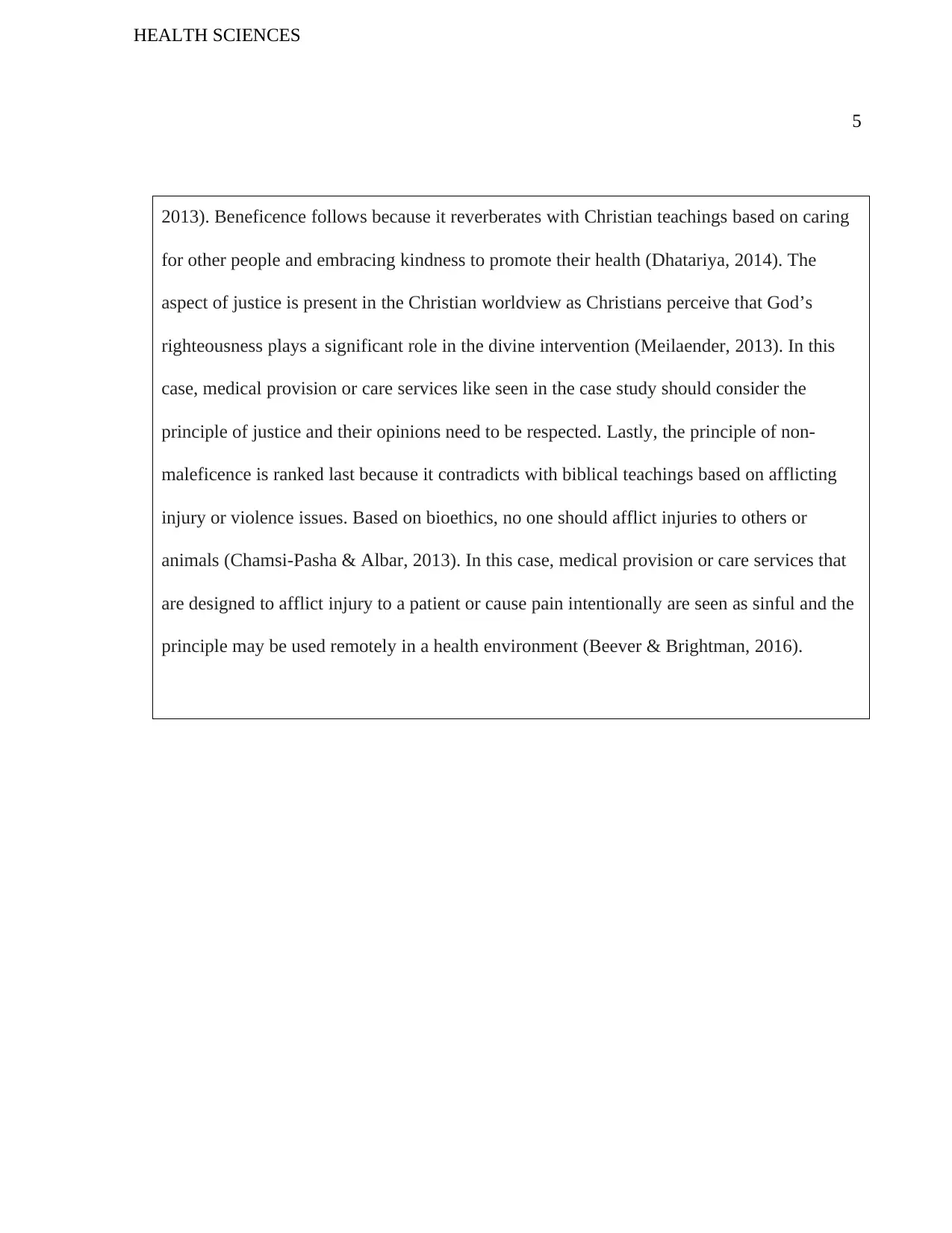
HEALTH SCIENCES
5
2013). Beneficence follows because it reverberates with Christian teachings based on caring
for other people and embracing kindness to promote their health (Dhatariya, 2014). The
aspect of justice is present in the Christian worldview as Christians perceive that God’s
righteousness plays a significant role in the divine intervention (Meilaender, 2013). In this
case, medical provision or care services like seen in the case study should consider the
principle of justice and their opinions need to be respected. Lastly, the principle of non-
maleficence is ranked last because it contradicts with biblical teachings based on afflicting
injury or violence issues. Based on bioethics, no one should afflict injuries to others or
animals (Chamsi-Pasha & Albar, 2013). In this case, medical provision or care services that
are designed to afflict injury to a patient or cause pain intentionally are seen as sinful and the
principle may be used remotely in a health environment (Beever & Brightman, 2016).
5
2013). Beneficence follows because it reverberates with Christian teachings based on caring
for other people and embracing kindness to promote their health (Dhatariya, 2014). The
aspect of justice is present in the Christian worldview as Christians perceive that God’s
righteousness plays a significant role in the divine intervention (Meilaender, 2013). In this
case, medical provision or care services like seen in the case study should consider the
principle of justice and their opinions need to be respected. Lastly, the principle of non-
maleficence is ranked last because it contradicts with biblical teachings based on afflicting
injury or violence issues. Based on bioethics, no one should afflict injuries to others or
animals (Chamsi-Pasha & Albar, 2013). In this case, medical provision or care services that
are designed to afflict injury to a patient or cause pain intentionally are seen as sinful and the
principle may be used remotely in a health environment (Beever & Brightman, 2016).
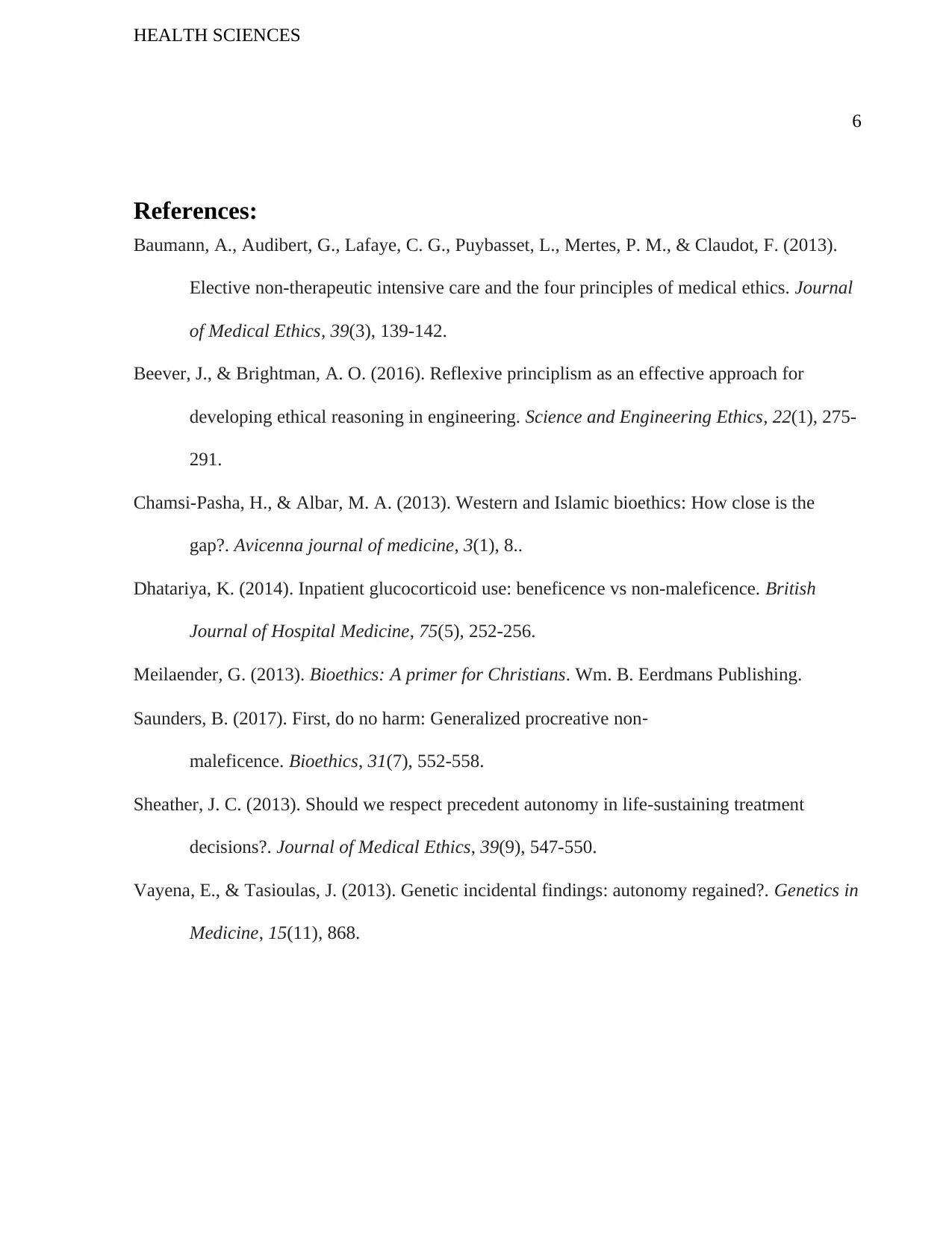
HEALTH SCIENCES
6
References:
Baumann, A., Audibert, G., Lafaye, C. G., Puybasset, L., Mertes, P. M., & Claudot, F. (2013).
Elective non-therapeutic intensive care and the four principles of medical ethics. Journal
of Medical Ethics, 39(3), 139-142.
Beever, J., & Brightman, A. O. (2016). Reflexive principlism as an effective approach for
developing ethical reasoning in engineering. Science and Engineering Ethics, 22(1), 275-
291.
Chamsi-Pasha, H., & Albar, M. A. (2013). Western and Islamic bioethics: How close is the
gap?. Avicenna journal of medicine, 3(1), 8..
Dhatariya, K. (2014). Inpatient glucocorticoid use: beneficence vs non-maleficence. British
Journal of Hospital Medicine, 75(5), 252-256.
Meilaender, G. (2013). Bioethics: A primer for Christians. Wm. B. Eerdmans Publishing.
Saunders, B. (2017). First, do no harm: Generalized procreative non‐
maleficence. Bioethics, 31(7), 552-558.
Sheather, J. C. (2013). Should we respect precedent autonomy in life-sustaining treatment
decisions?. Journal of Medical Ethics, 39(9), 547-550.
Vayena, E., & Tasioulas, J. (2013). Genetic incidental findings: autonomy regained?. Genetics in
Medicine, 15(11), 868.
6
References:
Baumann, A., Audibert, G., Lafaye, C. G., Puybasset, L., Mertes, P. M., & Claudot, F. (2013).
Elective non-therapeutic intensive care and the four principles of medical ethics. Journal
of Medical Ethics, 39(3), 139-142.
Beever, J., & Brightman, A. O. (2016). Reflexive principlism as an effective approach for
developing ethical reasoning in engineering. Science and Engineering Ethics, 22(1), 275-
291.
Chamsi-Pasha, H., & Albar, M. A. (2013). Western and Islamic bioethics: How close is the
gap?. Avicenna journal of medicine, 3(1), 8..
Dhatariya, K. (2014). Inpatient glucocorticoid use: beneficence vs non-maleficence. British
Journal of Hospital Medicine, 75(5), 252-256.
Meilaender, G. (2013). Bioethics: A primer for Christians. Wm. B. Eerdmans Publishing.
Saunders, B. (2017). First, do no harm: Generalized procreative non‐
maleficence. Bioethics, 31(7), 552-558.
Sheather, J. C. (2013). Should we respect precedent autonomy in life-sustaining treatment
decisions?. Journal of Medical Ethics, 39(9), 547-550.
Vayena, E., & Tasioulas, J. (2013). Genetic incidental findings: autonomy regained?. Genetics in
Medicine, 15(11), 868.
⊘ This is a preview!⊘
Do you want full access?
Subscribe today to unlock all pages.

Trusted by 1+ million students worldwide
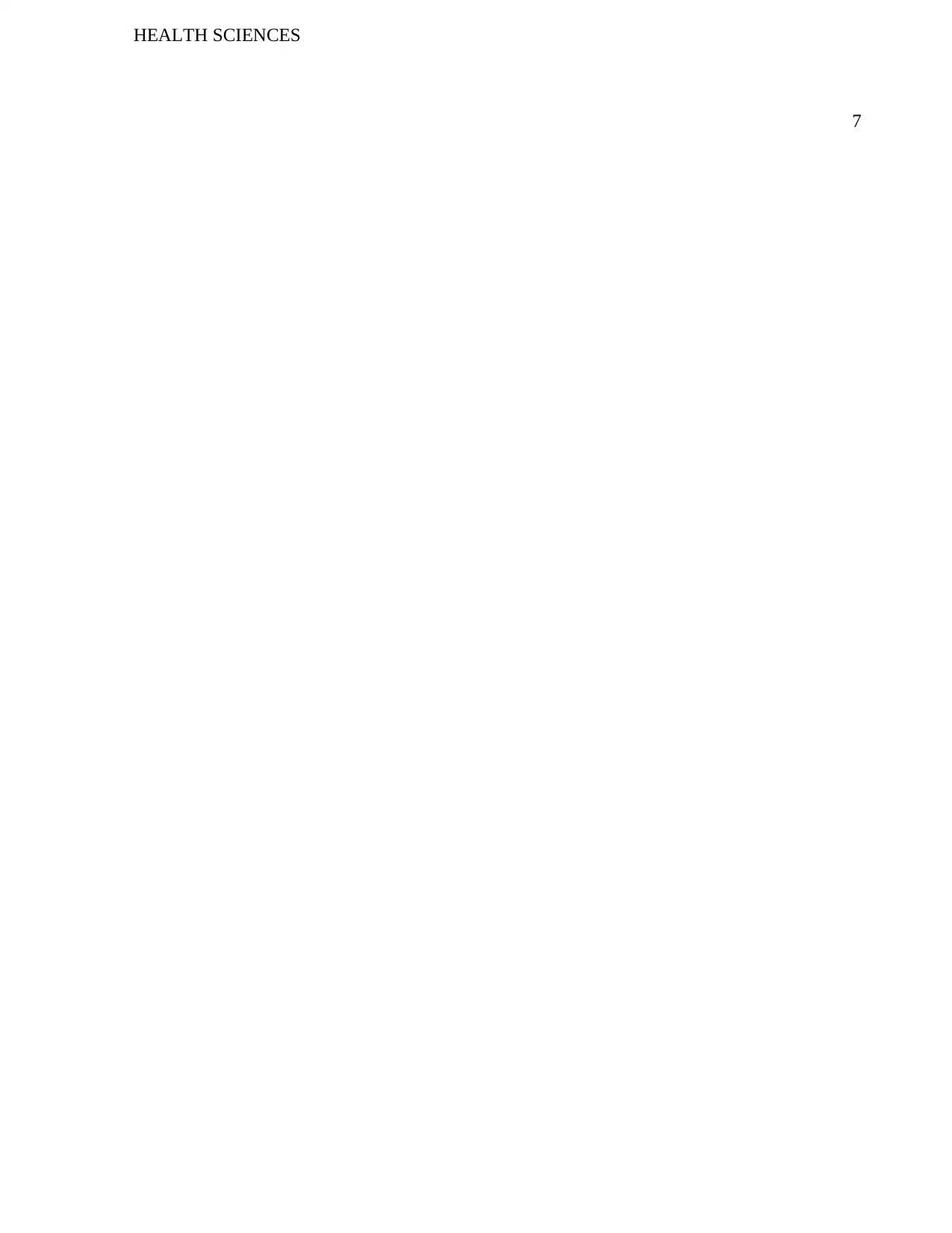
HEALTH SCIENCES
7
7
1 out of 7
Related Documents
Your All-in-One AI-Powered Toolkit for Academic Success.
+13062052269
info@desklib.com
Available 24*7 on WhatsApp / Email
![[object Object]](/_next/static/media/star-bottom.7253800d.svg)
Unlock your academic potential
Copyright © 2020–2026 A2Z Services. All Rights Reserved. Developed and managed by ZUCOL.





